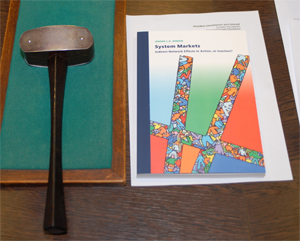System Markets: Indirect Network Effects in Action, or Inaction?
Indirect network effects are the source of positive feedback in system markets, or so network effect theory tells us. In his dissertation System Markets: Indirect Network Effects in Action, or Inaction?, Jeroen Binken examined demand-side and supply-side indirect network effects.
 The theory of indirect network effects argues that the supply of software and the demand for hardware affect each other. The amount of software that is available for a certain technology has a positive influence on the utility of the entire hardware-software system to the consumer. In this case, hardware and software are complementary and interdependent products. For instance, a video game system is composed of the video game console, on the one hand, and video games, on the other hand.
The theory of indirect network effects argues that the supply of software and the demand for hardware affect each other. The amount of software that is available for a certain technology has a positive influence on the utility of the entire hardware-software system to the consumer. In this case, hardware and software are complementary and interdependent products. For instance, a video game system is composed of the video game console, on the one hand, and video games, on the other hand.
Surprisingly, Jeroen Binken finds that the positive feedback cycle of indirect network effects is less pervasive, or at least more complex, than “current wisdom” would have us believe. Supply-side and/or demand-side indirect network effects, as traditionally operationalized, are often not present. When present, they display strong heterogeneity. There is often no positive feedback cycle present in the initial stage of the system’s life cycle. Software quantity is of little importance, while software products of exceptional high quality (i.e., superstars) play an important role. The empirical studies in this dissertation identify numerous factors marketing manager can manipulate to influence the positive feedback cycle. Subsequently marketing managers can incorporate the findings in their marketing strategy, and outmanoeuvre competitors (i.e., competing systems, fellow complementors).
Jeroen L.G. Binken defended his dissertation on November 5, 2010. His promoters were Prof. Dr. Stefan Stremersch and Prof. Dr. Harry Commandeur. Other members of the Doctoral Committee were Prof. Dr. ir. B.G.C. Dellaert, Prof. Dr. Ph.H.B.F. Franses and Dr. A. Lemmens.
About Jeroen Binken
Jeroen L.G. Binken (1974) obtained his Master degree in the Economic Sciences, from the Erasmus University Rotterdam, The Netherlands. In 2003, he started his PhD research at the Erasmus Research Institute of Management (ERIM) in the field of Marketing. This academic research has accumulated in numerous publications in leading scholarly journals such as the Journal of Marketing.
His main research interests are marketing of high-tech products, new product growth, and network effects. Binken has a two decade long experience in the fields of marketing and ICT that has made him a marketing authority in the area of (new) business development and marketing analysis of high-tech products. Predominantly solving managerial issues for international clients related to strategic marketing and corporate strategy, pertaining to the introduction of new products.
Abstract of ‘System Markets’
 This dissertation empirically examines system markets up close. More specifically it examines indirect network effects, both demand-side and supply-side indirect network effects. Indirect network effects are the source of positive feedback in system markets, or so network effect theory tells us. Systems are composed of complementary and interdependent products, such as hardware and software. For instance, a video game system is composed of the video game console, on the one hand, and video games, on the other hand.
This dissertation empirically examines system markets up close. More specifically it examines indirect network effects, both demand-side and supply-side indirect network effects. Indirect network effects are the source of positive feedback in system markets, or so network effect theory tells us. Systems are composed of complementary and interdependent products, such as hardware and software. For instance, a video game system is composed of the video game console, on the one hand, and video games, on the other hand.
Surprisingly, the positive feedback cycle of indirect network effects is less pervasive, or at least more complex, than “current wisdom” would have us believe. Supply-side and/or demand-side indirect network effects, as traditionally operationalized, are often not present. When present, they display strong heterogeneity. There is often no positive feedback cycle present in the initial stage of the system’s life cycle. Software quantity is of little importance, while software products of exceptional high quality (i.e., superstars) play an important role. The empirical studies in this dissertation identify numerous factors marketing manager can manipulate to influence the positive feedback cycle. Subsequently marketing managers can incorporate the findings in their marketing strategy, and outmanoeuvre competitors (i.e., competing systems, fellow complementors).


